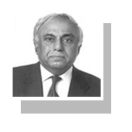Published in DAWN on January 31, 2022
THE passage of the SBP Amendment Bill that gives absolute powers to the central bank will remove the last hitch in the way of the revival of the suspended IMF programme. But it would also drastically change the bank’s job description and its relations with the country’s fiscal authorities. The amended law would have major implications. For starters, it declares price stability as the primary objective of the State Bank even though no clear inflation target is set for it. That will free the bank from its responsibility of bolstering economic growth and bar it from lending to the government or funding its quasi-fiscal operations. The bank would no longer extend any direct credit to or guarantee any obligation of the government or public entities. Financial stability will be the State Bank’s secondary function with support for development policies and fuller utilisation of resources as its tertiary responsibility. The bank will have full freedom to determine and implement monetary and exchange rate policy as the changes in the law eliminate the finance ministry’s role in its functions. The significance of these changes can be gauged from the fact that until now, the law was unclear on the State Bank’s exact role in targeting inflation as it was required to regulate the monetary and credit system and support growth and fuller utilisation of productive resources.
There is no denying that the need for central bank freedom in targeting price stability was being felt for a long time. The negative impact of excessive political intervention in its functions of monetary and exchange rate policy determination on the economy and current account under the previous PML-N administration also made many change their opinion. But concerns remain regarding the bank’s role in times of crises such as the Covid pandemic. Will it stick to its redefined mandate of price stability, or would it be willing to support economic growth in such crises? We don’t know. We’ve seen central banks across the world stepping in to support economic growth and recovery during the 2008 global financial crisis as well as after the outbreak of Covid in 2020. On both occasions, the IMF, which pushed Islamabad to change the State Bank law as a key condition for its funding, was standing behind them. State Bank autonomy is very desirable to prevent politicians from influencing the bank for political purposes. But we also need clarity on its role during such crises.



